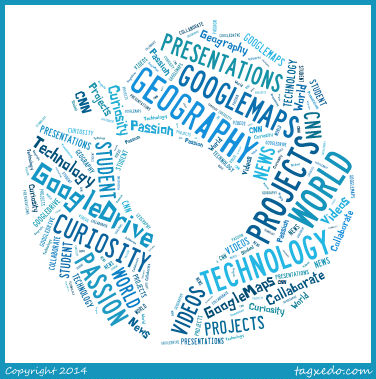Thomas L. Friedman, in an article titled, It’s P.Q. and C.Q. as Much as I.Q. (2013), says that we live in a hyperconnected world. It will require more individual initiative in order to adapt to this new world. He says that people will need more P.Q. (passion quotient) and C.Q. (curiosity quotient) to leverage all the new digital tools in order to succeed. For the culminating assignment for CEP 812 we were asked to create something to analyze how we as educators use the P.Q. and C.Q. that Friedman states are important in the hyperconnected world.
How do I use technologies in ways that demonstrate my passion and curiosity? 
I love studying the world. The world is 4.5 billion years old resulting in a lot of history to learn; therefore, I enjoy watch the History Channel and recently really enjoyed the Story of All of Us program about world history. At the same time, the world is constantly changing. I follow news outlets on Twitter and read news articles from BBC and CNN to keep up to date about the constant global changes. Also, I have been studying and working on my Masters of Arts in Education Technology in order to broaden my technology scope. I am glad I am able to explore the plentiful education technology resources available to educators.
Another major way I demonstrate my passion and curiosity for the world is through my involvement in People to People: Student Ambassadors. Throughout the school year, I help prepare students in my county to travel abroad with myself and other local teachers for two weeks during the summer. The two week program is a wonderful “technology tool” that provides first hand learning experiences for the students. The students are able to understand and appreciate other cultures. I love the People to People program because I am able to bridge my passion for traveling with my curiosity to learn more about world history; all while helping to inspire new minds to become global citizens.
How do I use technologies to inspire passion and curiosity in my students? 
The goal of my 9th Grade World Geography Class is that every student in my class becomes a global citizen. I use technologies to inspire my students to be passionate and curious about the world around them. Once a week, I have my students watch CNN Student News in the classroom to keep up on events in Syria and Ukraine amongst other relative issues. Each unit we also use technology to zoom into famous world monuments in GoogleMaps. Google also has GoogleDrive which is a great sharing and collaboration technology educational tool. In our last unit about Russia, my student used GoogleDrive to respond to questions after watching the Sochi Olympic Opening Ceremony.
The world is yours, what are you passionate and curious about?
References:
Friedman, T. L. (2013, January 29). It’s p.q. and c.q. as much as i.q. The new york times. Retrieved from http://www.nytimes.com/2013/01/30/opinion/friedman-its-pq-and-cq-as-much-as-iq.html
Provines, M. (2014, January 23). Globe Painting [Photograph].
Provines, M. (2014, March 5). Self Technologies Word Cloud. Retrieved from
http://www.tagxedo.com/
Provines, M. (2014, March 5). Student Technologies Word Cloud. Retrieved from
http://www.tagxedo.com/





